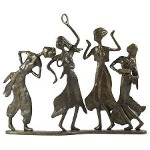It is about freedom. How do we extract ourselves from narrow spaces where our souls are confined, our hearts hurt?
Each year, we find that there are struggles before us, times and places where we feel tense and strained. We toil far too long each day. Our resources don’t cover our needs. We feel our efforts go unappreciated.
We face the illness of a beloved friend or family member. There’s a conflict brewing we’d rather avoid. We fear speaking out, we fear holding our frustrations in. We struggle with our own patterns, our own mistakes, our own unrealized hopes and dreams.
But at Passover, we have an opportunity to remember the long road to freedom our ancestors took. Their process can teach us about ours: Freedom is a prize we learn to earn. We ourselves create the freedom we long for.
This year, we will start our seder by singing through the hallways around the sanctuary. We will find the Sea of Reeds and break through to freedom. On the other side, instruments and music and joy. Avadim Hayinu – We were slaves but now we are free!
Before our seder begins, we will gather at long tables in groups to write down all those many things constraining us. We will post them on the walls around us. These are our own plagues. When we name them, we can free ourselves from them.
We will eat the food our own congregation has prepared. We will do some journaling in our Books of Life. Our children will lead the singing. We will celebrate our freedom and our joy.
Join us, and help us make our stories (and yours) real.
Our Passover seder begins at 5:30, April 7 at McGill Baptist Church in Concord. If you are interested in attending, please RSVP to info@or-olam.org







